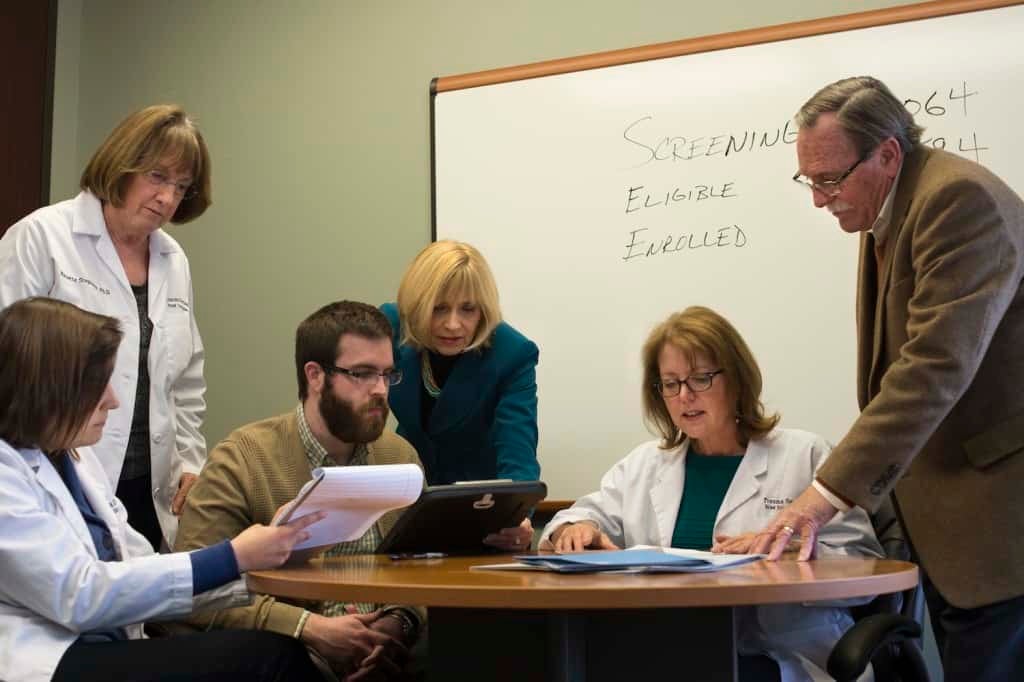 Lisa* checked into her primary care clinic to get treatment for an injured ankle. While at the clinic, she was also seen by Cassie,* a social worker who introduced herself as a behavioral health specialist with the program CHOICES. Cassie asked Lisa a few questions about her drinking habits and whether she used birth control. Lisa explained that she didn’t think too much about those issues because she was dealing with larger problems, including financial difficulties and getting back to school. They developed rapport, however, and Lisa returned for a second visit two weeks later. They talked some more about the risks of drinking while pregnant. At that time, Lisa also talked with her doctor about birth control because, after her initial conversation with Cassie, she wanted to know her options to avoid an alcohol-exposed pregnancy.
Lisa* checked into her primary care clinic to get treatment for an injured ankle. While at the clinic, she was also seen by Cassie,* a social worker who introduced herself as a behavioral health specialist with the program CHOICES. Cassie asked Lisa a few questions about her drinking habits and whether she used birth control. Lisa explained that she didn’t think too much about those issues because she was dealing with larger problems, including financial difficulties and getting back to school. They developed rapport, however, and Lisa returned for a second visit two weeks later. They talked some more about the risks of drinking while pregnant. At that time, Lisa also talked with her doctor about birth control because, after her initial conversation with Cassie, she wanted to know her options to avoid an alcohol-exposed pregnancy.
Drinking alcohol during pregnancy is a leading cause of birth defects and developmental disabilities in the United States. But every day, women like Lisa choose healthier behaviors that avoid alcohol-exposed pregnancies thanks to CHOICES, a program developed by researchers at the Health Behavior Research and Training (HBRT) Institute at The University of Texas at Austin’s School of Social Work.
CHOICES, which is being disseminated by the Centers for Disease Control and Prevention (CDC) has been implemented in more than 30 sites across the United States, as well as in Canada, Russia, and South Africa. Recently, CHOICES has been included in the National Registry of Evidence-Based Program and Practices.
CHOICES looks deceivingly simple: it consists of four 45-minute sessions with a behavioral health specialist, and one counseling visit with a family planning clinician, all done over a twelve- to fourteen-week period. To arrive to this point, however, HBRT researchers Mary Velasquez, Kirk von Sternberg, and Nanette Stephens have been working for the past thirteen years, along with colleagues from two other universities and the CDC. They developed and evaluated the program’s curriculum for acceptability and ease of delivery, and then tested it in a variety of settings to make sure it was really effective in changing people’s behavior.

There is much work and training behind each of the CHOICES sessions. To a casual listener, Lisa’s conversation with Cassie might sound informal and effortless. But Cassie was actually following the curriculum in the CHOICES manual, and using strategies and techniques she learned during her CHOICES training in Motivational Interviewing (MI), an evidence-based practice in itself that has proven highly successful in helping people change behaviors.
“We train behavioral health specialists in MI through intensive sessions,” explained Nanette Stephens, HBRT Training Director. “We also give our trainees the opportunity to practice their skills with trained actors posing as patients. And we have developed a coaching model, in which trainees record their sessions and send them to us. We listen to the recordings and use a coding scheme to measure the extent to which they are really using MI language and techniques during the session. We then use this to provide very specific feedback that helps trainees to enhance their MI skills.”
Programs like CHOICES, with their focus on modifiable health behaviors and proven effectiveness, are increasingly important in the changing healthcare landscape of the United States.
The current health reform under the Affordable Care Act creates new opportunities for this type of intervention, as it emphasizes the integration of primary care and behavioral health, and requires providers to cover behavioral health treatments at the same level as other types of care. The hope is that a better integration of behavioral health care services into the broader health care continuum will have a positive impact on quality, costs, and outcomes. This trend in healthcare also opens new opportunities for social workers.
“If you look across the country, behavioral health specialist jobs are increasing and becoming very visible,” explained Mary Velasquez, HBRT Director and the Centennial Professor in Leadership for Community, Professional and Corporate Excellence at the School of Social Work. “And many of these jobs are held by social workers, along with other professionals like master’s level counselors or psychologists. I think this trend is great for our students and future graduates, but also to show to the wider public that social work goes beyond case managing, that it is actually a clinical degree.”
HBRT team members are enthusiastic about the possibilities of collaboration that the Dell Medical School will bring to the UT Austin campus.
“Being involved in the creation of a medical school from the ground up is a unique opportunity,” Velasquez said. “We are entering a new and exciting time in health care and our School is well poised to meet the growing need for behavioral health programs that are based on sound scientific evidence, and that can be readily implemented in the community settings that our medical school will serve.”
For their next research steps, the HBRT team is building upon the success of CHOICES. They have recently tested with good results a briefer version that includes smoking as a target behavior. And they have now received funding to implement this briefer version of CHOICES, with an added component addressing obesity, in women’s health clinics of the UT Health Science Center-Houston Medical School.
“These are exciting times for us,” Velasquez said. “For the past twenty years, our research has focused on health behavior change, and on how we translate this research into programs that actually have an impact in the community. It’s very satisfying to see this coming to fruition.”
*Names have been changed
Posted March 5, 2014. By M. Andrea Campetella

